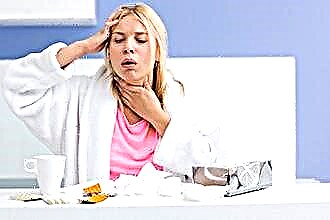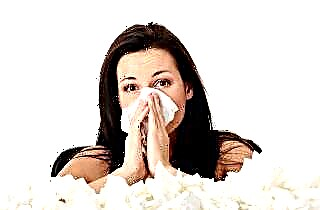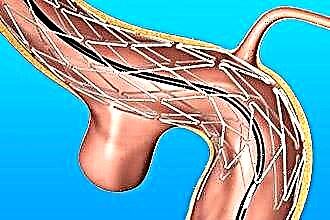 This may be due to:
This may be due to:
- abuse of cold foods (ice cream) and liquids (juices, kvass);
- fungal infection after prolonged antibiotic therapy;
- stay in a dusty room;
- mechanical damage to the mucous membrane of the pharynx by solid products (crackers), due to prolonged conversation, screaming or singing;
- an allergic factor (wool, dust, fluff, pollen, mold), which, after contact with the mucous membrane of the nasopharynx / oropharynx, provokes the development of pharyngopathy of allergic genesis.
Separately, it should be said about diseases of the thyroid gland, in which there is an overgrowth of glandular tissue and compression of nerve endings. In this case, an endocrinologist's consultation is necessary. Symptoms appear gradually and bother for a long time, despite home treatment.
Of course, viral diseases in the summer are not excluded, as well as an exacerbation of a chronic bacterial infection, for example, sinusitis, tonsillitis, against the background of a decrease in immune defense.
Streptococcus is often the cause of tonsillitis, but infection with staphylococcus or Haemophilus influenzae is also possible.
Therapeutic tactics
If there is a sore throat, what to do at home? To quickly cope with a symptom, you need to know the cause of its occurrence.
Compliance with the recommendations will speed up recovery:
- drinking plenty of fluids accelerates the elimination of toxic waste products of pathogenic microorganisms, reduces the severity of intoxication, replenishes fluid losses, and also lowers the temperature (in case of fever);
- proper nutrition with a high content of vitamins makes it possible to strengthen the immune system, which will accelerate recovery; healthy sleep and good rest;
- reduction of physical activity, stress;
- frequent ventilation of the room (not a draft), wet cleaning; air humidification
- ; rest in the vocal cords (do not scream, talk less);
- walks in the fresh air, dressing at the same time "according to the weather."
Elimination of an infectious agent
A sore throat may be the first sign of a viral infection.
In addition to perspiration, a person is worried about nasal congestion, rhinorrhea, lacrimation, aching joints and general malaise. In this case, it is necessary to take medicines with antiviral action to combat pathogenic microorganisms.
Note that such drugs also have an immunomodulatory effect, which is especially necessary in case of illness. To obtain the maximum therapeutic effect, it is necessary to start taking medications from the first day of a viral illness. Antiviral medicines include:
- Arbidol. In a dosage of 200 mg, the tablet is taken three times a day for 5 days, 25 minutes before meals.
- Groprinosine. It is taken three times a day for 5 days, 2 tablets (500 mg each) after meals.
- Remantadine is indicated for 5 days after a meal, following a specific regimen. On the first, second day - 2 tablets three times a day, then - twice a day with the same dose. On the fourth and fifth day, 1 tablet should be taken twice a day.
- Amiksin must be taken one tablet on the first, second and fourth day. The dosage of the tablet is 125 mg.
In addition, Aflubin, Otsilokoktsinum, Amizon, Influcid and other drugs have an antiviral effect.
If a sore throat is caused by an exacerbation of a bacterial disease or a primary infection is noted, a person is worried about febrile hyperthermia and severe malaise. Persecution quickly turns into severe pain, aggravated by talking, swallowing, and even observed in a dream.
If a bacterial disease is suspected, a study is required, the material for which is taken from the oropharynx / nasopharynx in the form of a smear. Based on the results of bacterial culture and antibioticogram, antibacterial agents are prescribed. Often used:
- Amoxiclav, which belongs to penicillins, is most effective for streptococcal infection. It is prescribed 1 tablet (500 mg) twice a day for 7 days.
- Cefotaxime - 1 tablet twice a day for 7 days.
- Azitrox (500 mg) - 1 tablet once a day for three days. The duration of the course and the dosage may vary depending on the severity of the disease.
If a fungal infection is detected in the pharynx, an antifungal course with the use of Fluconazole is recommended.
Local therapy
Gargling solutions, in the form of a spray or tablet form of preparations, can help get rid of perspiration. These drugs have antiseptic, anti-inflammatory, decongestant, analgesic and regenerative effects.
| Form of preparation | Name |
|---|---|
| Rinsing solutions | Miramistin, Chlorfillipt, Chlorhexidine, Givalex, Tamm-Verde, Furacilin, Stopangin, Rotokan. |
| Spray solutions | Miramistin, Orasept, Chlorophyllipt, Stopangin, Bioparox, Septolete, Strepsils Plus, Tantum-Verde, Givalex. |
| Tablet forms | Lizak, Lisobakt, Septefril, Strepsils, Septolete, Decatilen, Faringosept. |
| Solutions for lubricating tonsils | Lugol, Collargol, Carotolin. |
The use of iodine-containing preparations is permitted only in the absence of allergic reactions to iodine.
Traditional methods for topical application
For the treatment of perspiration at home, recipes using inhalation are suitable. Thanks to the splitting of the solution into small particles, it is possible to have a healing effect on the mucous membrane of the pharynx and larynx. To carry out the procedure, it is enough to boil water with a volume of two glasses, add oil (6-7 drops), after which inhalation should be started.
It is recommended to use olive, menthol or peach oil, which have a softening, anti-inflammatory and moisturizing effect on the mucous membranes. Chamomile oil, oak bark, eucalyptus or sage are enough to provide antiviral effect.
- to prepare a solution for inhalation, it is enough to pour 20 g of pine cones with 210 ml of boiling water. You need to insist the remedy for a day in a dark place;
- yarrow infusion (10 ml) and chamomile decoction (10 g per glass of boiling water) should be mixed and used for inhalation.
Having a nebulizer at home makes inhalation much easier. However, remember to prohibit the use of oil solutions in the device. They contaminate the device, as a result of which the nebulizer can become a source of infection.
The benefits of a nebulizer include:
- steam temperature control;
- a clear dosage of the medication;
- ease of use;
- constant supply of the drug;
- does not require breath synchronization;
- adjusting the diameter of the resulting particles of the drug in a pair.
For a nebulizer, Rotokan, alkaline still water (Borjomi, Essentuki), Furacilin, Dekasan and other antiseptic solutions are suitable.
It should be borne in mind that the solution for the nebulizer should be diluted with saline. The device requires 1 ml of saline, and 4 ml of the prepared medicine is enough for one procedure.
Before starting inhalation without using a nebulizer, you must make sure that the temperature of the steam does not burn the upper respiratory tract.
For rinsing, the following recipes are used:
- for cooking, you need to finely chop the herbs (eucalyptus, calendula, sage). The volume of each ingredient is 15 g. Having filled the herbal mixture with half a liter of water, it should be boiled for a quarter of an hour. After cooking, you need to filter the broth, add 15 g of honey and citric acid in a volume of 1 g.
- you can prepare a solution for rinsing sage, calendula and chamomile with a volume of 10 g each, which is enough to brew in two glasses of boiling water under a lid.
- chopped herbs (birch leaves, oak bark, willow, viburnum), 5 g each, are poured with boiling water (240 ml) and infused for 2 hours.
- 5 ml of onion juice must be dissolved in a glass of warm water, after which it is used for rinsing;
- soda-salt medicine is prepared by mixing ingredients in a volume of 5 g. To enhance the therapeutic effect, you can add a couple of drops of iodine.
Rinsing must be carried out observing certain rules:
- after rinsing, you should not drink liquid, take food for half an hour;
- rinsing solutions must be alternated throughout the day in order to prevent the development of resistance of pathogenic microbes to a certain medication;
- the procedure is repeated every 90 minutes.
Peach oil and propolis tincture are suitable for lubricating the tonsils with inflammation. The volume of the oil is 30 ml, and the dose of the tincture is 15 ml. After thoroughly mixing the ingredients, the medicine is applied to a cotton swab and the affected mucous membrane of the oropharynx or nasal cavity is lubricated.
Propolis tincture and honey are used for rinsing, ingestion and lubrication of the mucous membrane only if there is no allergy to bee products.
Traditional therapy for internal use
To strengthen the immune defense, fight infectious pathogens and reduce inflammation, you can use folk recipes:
- cloves, chopped ginger and cinnamon extract are mixed in a volume of 10 g. The mixture is poured with boiling water (230 ml). After the infusion has cooled to 40 degrees, honey, lemon juice are added, after which 70 ml should be taken three times a day.
- boil milk with a volume of 240 ml with chopped ginger (10 g) and turmeric (15 g), cool the broth a little, add honey, and then take in small sips throughout the day. The total volume of the medicine can reach three glasses per day.
If you experience a sore throat, you should immediately start treatment at home. For this, rinsing and inhalation are suitable. If the intensity of perspiration increases, a sore throat and other symptoms of the disease appear, general strengthening therapy should be started with the intake of medicinal decoctions and vitamins. In the event that, despite the ongoing therapy, the disease progresses, after 2 days you need to consult a doctor.



